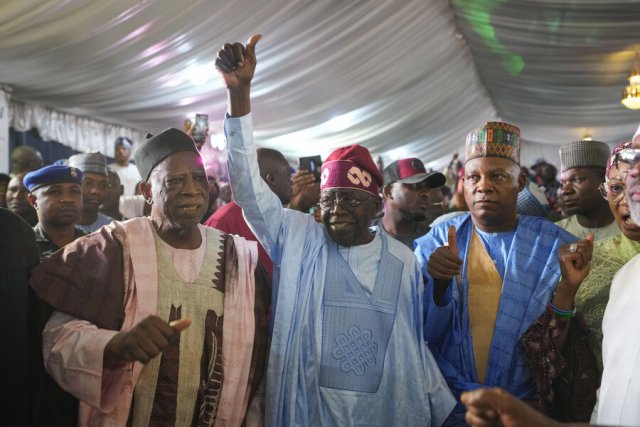
The Independent National Electoral Commission (INEC), on Wednesday declared the candidate of the ruling All Progressives Congress (APC), Mr. Bola Tinubu, as the winner of last Saturday’s presidential election.
Tinubu defeated 17 other candidates who took part in the election.
INEC chairman Prof Mahmood Yakubu, who announced the final results in Abuja, said the 70-year-old former governor of Lagos State gained 8,794,726 votes, amounting to 36% of the votes counted in Nigeria’s most tightly contested election since its return to civilian rule in 1999.
He also scored over 25 per cent of the votes cast in 30 states, more than the 24 states constitutionally required.
The main opposition Peoples Democratic Party (PDP) candidate Mr. Atiku Abubakar polled 6,984,520 votes (29%); Labour Party candidate Mr. Peter Obi, polled 6,101,533 (around 25%.) to emerge third while Mr. Rabiu Kwankwaso of the New Nigeria Peoples Party NNPP) came fourth with 1,496,687 votes.
Yakubu announced that a certificate of return for the president and vice president will be presented by 3 p.m. on Wednesday at the national collation centre.
Only the top four candidates won the presidential election in at least one state.
Each of Messrs Tinubu, Atiku and Obi won in 12 states while Kwankwaso won only in Kano.
However, winning a majority of states is not a requirement for a candidate to be declared the winner of the election.
States won
Tinubu won the election in Rivers, Borno, Jigawa, Zamfara, Benue, Kogi, Kwara, Niger, Osun, Ekiti, Ondo, Oyo and Ogun states.
Atiku won in Katsina, Kebbi, Sokoto, Kaduna, Gombe, Yobe, Bauchi, Adamawa and Taraba states. He also won in Osun, Akwa Ibom and Bayelsa states.
Obi won in Edo, Cross River, Delta, Lagos, FCT, Plateau, Imo, Ebonyi, Nasarawa, Anambra, Abia and Enugu states.
Kwankwaso won in only Kano State.
Final of the 2023 presidential election as presented by the INEC chairman at the collation centre Wednesday, March 1, 2023
Total registered voters: 93,469,008
Accredited voters: 25,286,616
A 61,014
AA 14,542
AAC 14,608
ADC 81,919
ADP 43,924
APC 8,794,726
APGA 61,966
APM 25,961
APP 12,839
BP 16,156
LP 6,101,533
NNPP 1,496,687
NRM 24,869
PDP 6,984,520
PRP 72,144
SDP 80,267
YPP 60,600
ZLP 77,665
Total valid votes: 24,025,940
Total rejected votes: 939,278
Total vote cast: 24,965,218
With Premium Times report
Meanwhile, the PDP, LP and ADC in a joint press conference on Tuesday, the PDP, demanded Yakubu’s resignation and a rerun of what they called “sham” presidential and National Assembly elections.
LP national chairman Julius Abure accused the INEC of failing to comply with the provisions of the Electoral Act 2022, introduced by the Buhari administration to build trust in the country’s election process and ensure free and fair elections.
“We have a responsibility to the millions of Nigerians who put their faith in us and our presidential candidates to defend our country from the forces that seek to tear us apart.
“President Buhari, this is the time of great test of your integrity, use your office to save Nigeria from this electoral mismanagement and save your legacy,” Abure said.
However, Buhari on Wednesday morning congratulated Tinubu and said he was the best man for the job, asserting that the legitimacy of the election was not in doubt and urging opposition parties seeking to challenge the result to “take it to the courts, not to the streets.”
Tinubu is credited during his two terms as governor of Nigeria’s economic capital of Lagos with increasing the state’s revenue and bolstering economic activity.
However, he caused controversy during the campaign by choosing a fellow Muslim as his running mate, violating an unwritten rule in Nigerian politics to share power between Christians and Muslims.
Lack of transparency and operational failures
A European Union Election Observation Mission (EU EOM) said on Monday that a “lack of transparency and operational failures reduced trust in the process and challenged the right to vote.”
Though largely peaceful, the election was held against a backdrop of insecurity and prevailing shortages of both fuel and the country’s naira currency, which the EU EOM report said hampered INEC’s operational capacity, along with attacks on certain INEC premises and voter intimidation.
“Abuse of incumbency by various political office holders distorted the playing field and there were widespread allegations of vote buying,” the EU EOM report said.
The widely welcomed Electoral Act included the introduction of a Bimodal Voter Accreditation System (BVAS) and result viewing portal (IReV), technologies perceived as an important step in shoring up the integrity and credibility of future elections.
However, the EOM noted that delayed training and inadequate mock testing, along with a lack of public information on the technologies, diminished expectations among voters and “left room for speculation and uncertainty.”
INEC acknowledged that “technical hitches” had delayed the uploading of results onto the IReV, which had recorded only 20% of presidential election votes by noon the day after polling.
A Commonwealth Observer Group led by former South African President Thabo Mbeki delivered a more favorable preliminary assessment on Monday, determining that “notwithstanding the shortcomings identified in these elections, Nigerians were largely accorded the right to vote.”
“We congratulate all Nigerians for their determination, patience and resilience displayed throughout the electoral process,” Mbeki told journalists on Monday.
However, the COG also highlighted a host of logistical problems that resulted in voter disenfranchisement, long queues, technological issues, “not always positive” behavior from party agents and procedural inconsistencies in closing and counting ballots.
With Premium Times, CNCB reports
























































